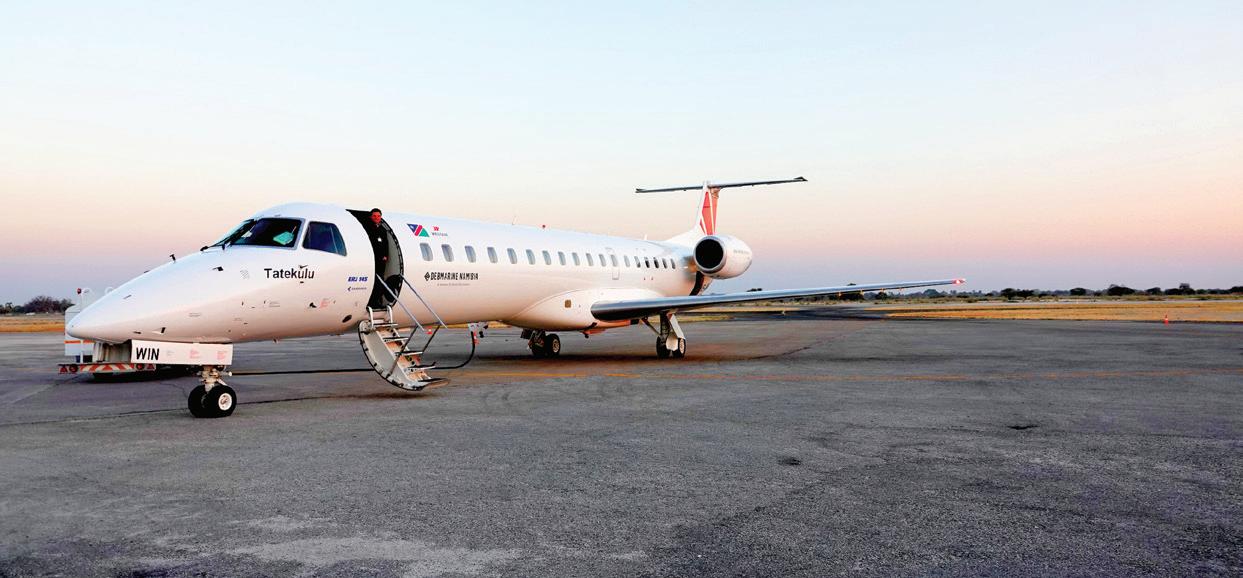
6 minute read
WE NEED TO TALK ABOUT NAMIBIAN STEREOTYPES
Namibian Stereotypes We Need To Talk About
Three Namibian myths floating around in popular discourse are totally debunked.
Albert Einstein is credited with saying many wise things. There are, however, many sayings the world-changing physicist never uttered. For example, one of them is this: Namibians will arrive when they are here. The genius in the statement is immediately obvious, and it is easy to see why Einstein could be believed to have made such an observation. Taking friction as a force (F) which slows down acceleration; factoring in gravitational pull (G); multiplying that with the number of expected guests (RSVP); dividing the resulting number with the need for an event to start on time (Asseblief tog!); and cubing that with the actual time at which most people begin to get ready for events (“Yes, yes. I’m just around the corner!”) yields the following answer: they will be here when they are here. With Einstein being preoccupied with physics and time and whatnot, it is easy to assume he discovered this local genius. Not so. This exquisite wisdom comes from none other than Namibians themselves. What Einstein can be credited with, though, is the following: “If you judge a fish by its ability to climb a tree, it will live its whole life believing that it is stupid.” Now that is the darnest true. When making comparisons, it is essential to compare apples with apples, oranges with oranges, and whatever one saw, ate, heard, or experienced in London with exactly what one saw, ate, heard, or experienced in London. Not Madrid. Not New York. Not Kuala Lumpur. Certainly, not Windhoek, or any other place in Namibia. The logic is sound: mopane worms must be compared to mopane worms, and South Africa’s excuse for biltong cannot be compared to the much superior quality of dried meat which Namibia offers. Thank you, Einstein. With that said, three common myths about Namibia need to be dispelled. There is only one type of heat in Namibia. This is not true. Only temporary sojourners are unable to distinguish between the rich array of weather conditions in this country. “Sunny” is used to describe a very thin window of sunshine – typically between 07h00 and 07h15. Thereafter, “hot” is used. At 09h00, “scorching” is an accurate way of describing the effect of the sun on anything that moves. Later, in the day, “stifling”, “torrid”, “searing” and “withering” are good ways to describe the temperature changes every two or three hours. However, it should be stressed that descriptions differ according to geographic location. Thus, in the far north of the country, “sweltering” and “stifling” do admirable jobs of trying to encapsulate the high summer conditions, while in the deep south, various Afrikaans expletives which cannot be printed on these respectable pages will more accurately reflect one’s feelings about the weather. There is nothing to do. This generalisation is made mostly by jet-setters used to travelling to cosmopolitan capitals or metropolitan megalopolises in which festivals, sporting events and cultural calendars are now in their hundredth iteration; places in which things are either done for them, or where things are already happening by the time the plane’s wheels touch down. By such comparisons, nothing would be ‘quite a lot’ by Namibian standards. Locally, though, there are any number of cultural activities in which to partake. The theatre and the performing arts scene might be small but continue to produce enriching work; the social dancing scene, a monthly staple in the capital, has held steady for four years now; and there is a handful of restaurants which cater to various tastes. Also, gluten-free and lactose intolerant persons will be delighted to know their maladies have been deescalated from lifestyle choice status, and can now find food options on various menus. It is not that there is nothing to do. It is that in Namibia, if you want something, you have to go out and look for it yourself. There is no customer service. This statement needs clarification. For there to be customer service, there would have to be “customers” in their conventional sense. Since everyone is related to everyone else, or everyone knows everyone else, everybody is treated in one of two ways: a) as a distant but unknown cousin (meaning with politeness and some curiosity) or b) a close and despised cousin (meaning with indifference and a go-get-it-yourself attitude). Knowing which side of the cousin divide one belongs in will prevent misunderstandings in numerous transactional dealings. More myths abound about Namibia, too many to list here. One would need, say, a Nobel Prize lecture to fully encompass the array of relative untruths about the beloved land of savannahs. But, for now, respect and homage needs to be paid to Einstein’s wisdom: if you compare a country to a dream, it will spend all of its time trying to wake up. Rémy Ngamije is a Rwandan-born Namibian novelist, columnist, essayist, short-story writer, and photographer. His debut novel The Eternal Audience Of One is available from Blackbird Books and Amazon. His short stories have appeared in Litro Magazine, AFREADA, The Johannesburg Review of Books, The Amistad, The Kalahari Review, American Chordata, Doek!, and Azure. More of his writing can be read on his website: remythequill.com It is not that there is nothing to do. It is that in Namibia, if you want something, you have to go out and look for it yourself.
A SPECIAL EDITION FLYWESTAIR MOHENN TRAVEL DUFFLE
Take an awesome photo on your flight with us (the view, yourself, our crew, anything!) In the caption, tell us why you fly with FlyWestair Tag FlyWestair on Facebook, Instagram or Twitter (or send your image to fly@venture.com.na) The winning image will be selected by a panel of FlyWestair judges. You can enter as many times as you want. Entries close 27 March and the winners will be announced on 3 April 2020. Follow @mohenn_ on Instagram to check out his stunning range of luxury leather goods.
We’ve received many great entries so far! Why do fly with FlyWestair?
Such friendly crew on my flight to Cape Town in October 2019 - Theresa Serfontein

The reason why I fly with @fly_westair is that it’s very affordable and the service is amazing. - @gorgeous_tangi

40 I choose Westair because I feel like royalty when I fly with them! - Mathilde Brassine

A spectacular view of the clouds #FlyWestair - @sunnykemma
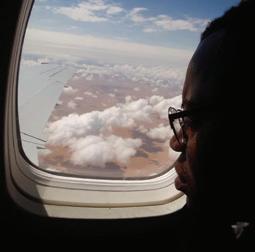
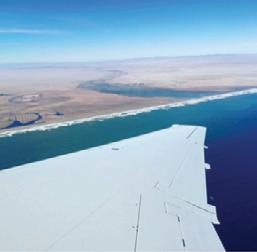
I feel the same in the air than on the ground - Gideon K. Muremi
Thank you for your professional service, friendly staff onboard and ensuring my safe, smooth return back home @fly_westair Couldn’t have ended an amazing weekend spent in Cape Town on any better note! Here’s to plenty more trips with you #flywestair - @binxx10

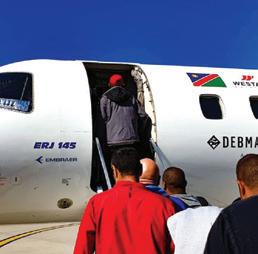
Back to the grind, to start another rotation offshore Namibia ! Cape Town to Oranjemund with @fly_westair ‘s Tatekulu Embraer ERJ 145 - @csfluffy
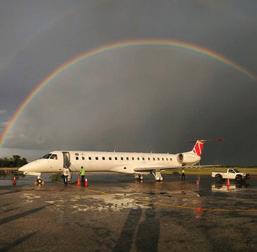
Ondangwa with a full rainbow It was my first time flying with Westair and I will definitely fly again. The attention to detail goes a long way, with a fresh, mini croissant for breakfast and then a mini Fairview cheese platter + Ferrero Rocher on the evening flight. - @itsdanifaria










